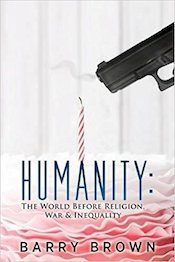As is always the case after a horrific act by one group is followed by Western retaliation, the story is framed as a moral response to an immoral act.
Did Syria deliberately use chemical weapons on those civilians?
Does it matter?
The response was a bombing raid on Syria that was widely cheered by many leaders and commentators.
But when has bombing ever brought peace? Killing and destruction in the name of God or nations may bring short-term psychological satisfaction, but it will inevitably bring about a response of more killing and more destruction. Indeed, North Korea responded to news of the attack with threats of building more long- and short-range missiles. And the U.S. replied with war ships.
If killing and destruction led to peace, America’s reaction to the attacks of 9/11 would have been very different from its current foreign policy of revenge killings and attempts to control other countries through military force and occupation. And, of course, 9/11 and other terror attacks are promoted as lethal replies to oppression – mainly decades of military invasions and government manipulations by various superpowers against vulnerable people around the world.
We are moralizing our way to madness.
Each side claims a moral high ground so pure that it can only strike out at the impure world around them as if other people and different ideas were a flesh-eating bacteria  infecting “their” world, and so must be degraded and eradicated. The old common notion that everyone is flawed and must strive for improvement has been cast aside in favor of illusions of grandeur and a world of comic book superheroes and super-villains. Respect for others, polite behavior and common interests are scorned in favor of every-narrowing identity labels – white, Black, Christian, Muslim, liberal, conservative, man, woman – and then how white, how Black, how Christian, how Muslim, liberal, conservative, manly or feminine are you really?
infecting “their” world, and so must be degraded and eradicated. The old common notion that everyone is flawed and must strive for improvement has been cast aside in favor of illusions of grandeur and a world of comic book superheroes and super-villains. Respect for others, polite behavior and common interests are scorned in favor of every-narrowing identity labels – white, Black, Christian, Muslim, liberal, conservative, man, woman – and then how white, how Black, how Christian, how Muslim, liberal, conservative, manly or feminine are you really?
It’s a downward spiral of division that leads to multiplying hatreds, cascading fears and social breakdown. When people have no faith in their fellows and the common spirit of friendship that allowed civilization to take root and spread around the globe, civilization must tear itself apart. When common history and purpose are forgotten, anarchistic groups will continue to attack and shred the old fabric with violence and greed until a new patchwork of commonality is created.
There are obvious signs of those tensions and fears civilization could self-destruct. But many old civilizations have collapsed in the past 6,000 years, and humanity has recovered. The source of the courage that kept humanity moving forward was individual and collective faith in ourselves and each other. Faith is the seed of courage and faith in humanity gave birth to wonders of civilization. Beliefs in hatred and divisions are unsustainable because they are temporary. Anger is not a way of life. Faith is. This is because faith – in God, science, personal strength or anything else – is a child of experience and knowledge and so, like a child, it grows and changes over time. The faith you have today is not the same as the faith you had in the past and faith will change in the future. Faith is different from beliefs because beliefs do not change – they exist to be repeated. The beliefs of religious, political, scientific and social groups are today’s loyalty tests, even though those beliefs are like simple passwords. Once hacked, anyone can use them to manipulate trust and con the gullible.
Faith is an individual, daily experience of life. It’s how we understand the present and frame the future. As such, faith is shared by all living things in some form.
Today, knowledge is often gathered from packaged and processed sources served up on a screen. In this way, the old faith of personal exploration is easily replaced by beliefs that demand loyalty and compliance by followers and the collective shunning and condemnation of those with different passwords.
Humanity’s faith in sharing words, invention and ideas was how a common human civilization first spread around the world more than 40,000 years ago. To protect the course of humanity’s future, we only have to remember the road we followed to build it.